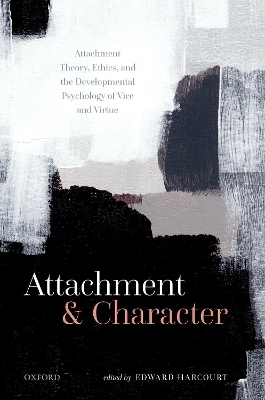
Attachment and Character
Oxford University Press (Verlag)
978-0-19-289812-8 (ISBN)
There are many exciting points of contact between developmental psychology in the attachment paradigm and the kinds of questions first raised by Aristotle's ethics, and which continue to preoccupy moral philosophers today. The book brings experts from both fields together to explore them for the first time, to demonstrate why philosophers working in moral psychology, or in 'virtue ethics' - better, the triangle of relationships between the concepts of human nature, human excellence, and the best life for human beings - should take attachment theory more seriously than they have done to date.
Attachment theory is a theory of psychological development. And the characteristics attachment theory is a developmental theory of - the various subvarieties of attachment - are evaluatively inflected: to be securely attached to a parent is to have a kind of attachment that makes for a good intimate relationship. But obviously the classification of human character in terms of the virtues is evaluatively inflected too. So it would be strange if there were no story to be told about how these two sets of evaluatively inflected descriptions relate to one another. Attachment and Character explores the relationship between attachment and prosocial behaviour; probes the concept of the prosocial itself, and the relationship between prosocial behaviour, virtue and the quality of the social environment; the question whether there even are such things as stable character traits; and whether attachment theory, in locating the origins of virtue in secure attachment, and attachment dispositions in human evolutionary history, gives support to ethical naturalism, in any of the many meanings of that expression.
Edward Harcourt has been a Fellow of Keble Collge, University of Oxford, since 2005, and before that held posts at the University of Kent and at Lady Margaret Hall, Oxford. He has been a Mind Association Research Fellow and has held visiting posts at Berkeley, Leipzig, and Williams College. Before taking the BPhil and DPhil in Oxford he was an undergraduate at Trinity College, Cambridge, where he read Philosophy (Part I) and History (Part II). He convened the seminar series Meaning and Mindedness: Encounters between Philosophy and Psychoanalysis at the Tavistock Clinic (London), and is a director of the biennial Oxford Summer Schools in Philosophy and Psychiatry. He is currently on secondment as Director of Research, Strategy and Innovation at the Arts and Humanities Research Council.
Edward Harcourt: Introduction
1: Ross A. Thompson: Attachment Theory and Moral Development
2: Marian J. Bakermans-Kranenburg & Marinus H. van IJzendoorn: Dimensions, Determinants and Development of Prosocial Behaviour: A Differential Susceptibility Hypothesis on Attachment and Moral Character
3: Jonathan Hill: Attachment, the Virtues and the Vices: Some Developmental and Conceptual Considerations
4: Darcia Narvaez: The Evolved Nest, Virtue and Vice
5: Keith S. Cox & Micah Lott: The Virtues of Attachment
6: Jay Belsky: Beyond Virtue: The Development Of Reproductive Strategies
7: Edward Harcourt: Two Routes from Secure Attachment to Virtue
8: Terence Irwin: Education for Virtue: Aquinas on Passions and Attention
9: Katrien Schaubroeck: Attachment, Virtue and the Second Person
10: Alison E. Denham: An Aetiology of Recognition: Empathy, Attachment and Moral Competence
11: Monique Wonderly: Attachment, Addiction, and Vices of Valuing
| Erscheinungsdatum | 29.11.2021 |
|---|---|
| Verlagsort | Oxford |
| Sprache | englisch |
| Maße | 165 x 240 mm |
| Gewicht | 568 g |
| Themenwelt | Geisteswissenschaften ► Philosophie ► Ethik |
| Geisteswissenschaften ► Psychologie ► Entwicklungspsychologie | |
| ISBN-10 | 0-19-289812-4 / 0192898124 |
| ISBN-13 | 978-0-19-289812-8 / 9780192898128 |
| Zustand | Neuware |
| Haben Sie eine Frage zum Produkt? |
aus dem Bereich


